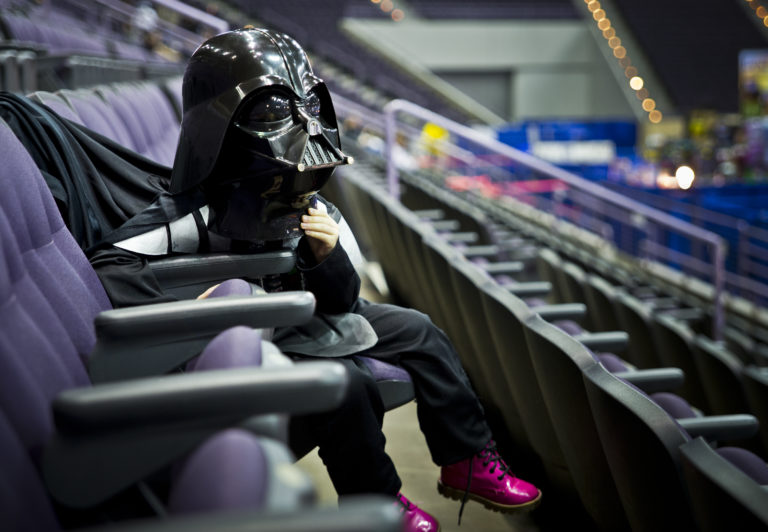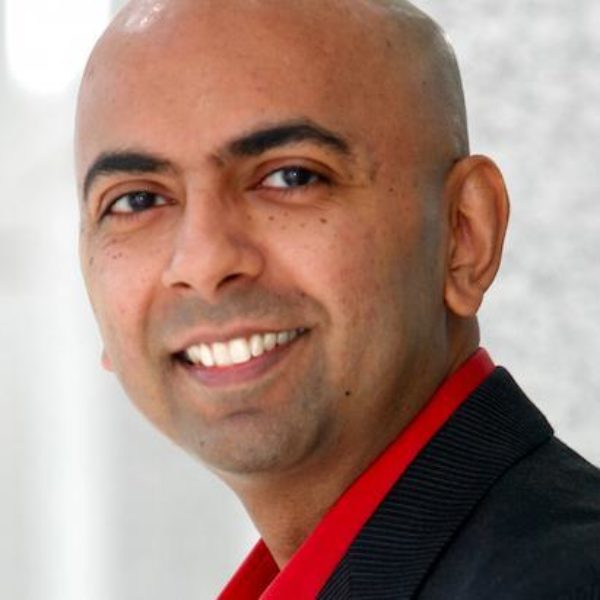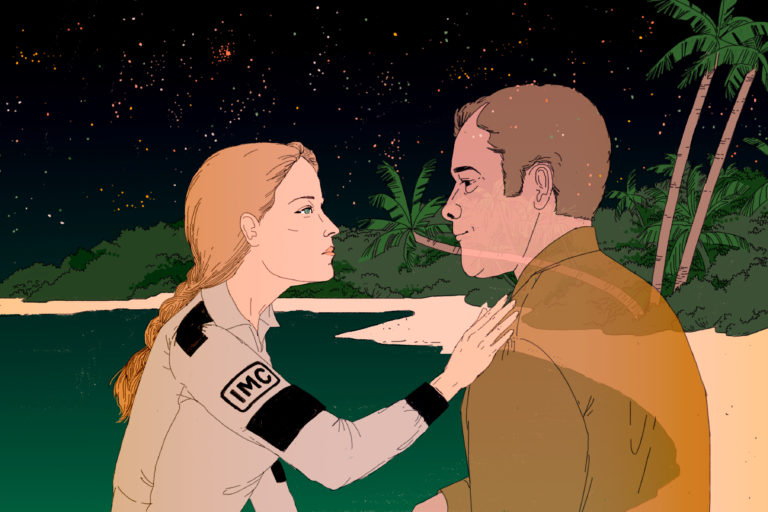
Image by Samuel King Jr..
The Forces Inside of Us: “Star Wars” as a Modern Mythology for Our Time
Imam Ali, the cousin and son-in-law of the Prophet Muhammad, is reported to have said:
“Man thinks of himself as a small creature, but inside him is folded up the entire cosmos.”
I have been thinking about this connection between personal events and cosmic events as I join the legions of fans who wait with Advent-like anticipation for the release of Star Wars: The Force Awakens. It all makes me wonder what exactly it is that we are anticipating.
Is it the revival of a successful franchise that might reinvigorate filmmaking with new blood? Sure. Is it nostalgia for childhood, when our young minds first encountered R2-D2, Darth Vader, and Luke Skywalker? Of course. Is it also the re-awakening of a modern mythology that gives us hope and meaning in the face of all the harsh conflicts in our world? Absolutely.
The breakdown of the Republic into the Empire and the Rebel Alliance mirrors over and over again similar breakdowns in many countries around the globe. As various marginalized groups struggle for equal rights, equal pay, and equal representation, the Old Guard has not been pleased and has struck back with vengeance.
It’s in times like these that we must look around and ask ourselves: Which side am I on? Do I wear the uniform of the Empire but have sympathies for the rebellion? Am I sitting on the sidelines and hoping the conflict will work itself out because it’s not my problem? Am I part of the Rebel Alliance but fighting in a way that might make me lose my humanity? What is the character of my engagement? Where do my loyalties lie?
This is where seeing Star Wars as mythology and not merely entertainment can prove to be instructive and inspirational. The characters of Star Wars are not just characters in a movie. Like any character in a myth or a dream, they are personifications of the forces inside us.
Anakin, for instance, is the part of us that craves power and prestige. Luke is the part of us that is deeply loyal to our friends. Obi-Wan is the part of us that wisely waits for the right moment to act. Leia is the part of us that feels called to serve the common good. Rey is the part of us that feels gifted yet alone in the world. Finn is the part of us that knows we’re on the wrong path and something needs to change.
These characters look and act different from each other, but we recognize them all as aspects of ourselves. We all embody each of these characters from time to time, depending on the circumstances. We walk, we fall, we get up again — just like these characters. We are kind, we are cruel, we are at peace, we are at war — just like these characters.
The movement of these forces inside us matches the movement of similar forces out there in the stars. We are all local actors playing out themes and motifs in a larger play. The conflict in our lives reflects the war in our stars. As the Hermetic teachings declare, “As above, so below.”
Yet here is the crucial distinction: what is happening above may set the stage, but it does not determine the outcome. Through our own deliberate choices, we can create a different future, even one that transcends war. The stars will keep writing our story until we take the pen back and write our own.

Yoda and Obi-Wan are the parts of us that have already transcended war. Anakin betrayed the Jedi Order and the Republic fell, destroying much good that had sustained civilizations for centuries. And yet Yoda and Obi-Wan didn’t give in to anger and hatred. They made wise decisions and waited until the time was right to act.
Obi-Wan watched over Luke on Tatooine. Yoda deepened his understanding of the Force on Dagobah, staying undetected by the Empire while waiting for Luke to mature so he could train him. All this was done not in an attempt to take revenge upon the Empire, but to re-establish a more civilized society. By staying committed to knowledge and compassion, they were able to transcend the war in their own minds and hearts and serve the common good.
After all, the greatest gift of the Force is not the ability to move objects with one’s mind, but a real sense of one’s connectedness to all people, all creatures, all things, all places. When we can feel the unity between ourselves and everyone else, anger and hatred lose their value as well as their hold on us. This vision of unity is the source of our knowledge and compassion. More importantly, it is the source of our hope.
As we look around at the world today, we see that we are in the midst of great conflicts between many Empires and many Rebel Alliances. Sustainable solutions to these conflicts are not easy to find. But there is much to be hopeful for. There are many people of conscience making local efforts, listening, feeding, healing, caring, speaking truth to Empire. We must multiply their efforts with our efforts.
It all starts with a personal commitment to unity, knowledge, and compassion. To end the war in our stars, we first have to end the war inside ourselves. This is what Prophet Muhammad was talking about when he talked about jihad. This word has been mistranslated as “holy war.” It actually means “effort.” What it actually refers to is the effort we make to choose unity over division, knowledge over ignorance, compassion over apathy. It is the continuous choosing of our wise selves over our reactive selves in all the choices we make.
It is not enough to use our knowledge to advance technology, to build new mobile apps, or to visit Mars. We must use our knowledge to get to know each other, to see all people without exception as members of one large family. It is not enough to be moved by compassion only when we are made aware of great tragedy. We must allow ourselves to be moved by compassion as a daily practice in all the small ways we might be overlooking. This is how we gradually end the war inside ourselves and eventually transcend war itself so that the stars might learn something from us.
We can keep this in mind as we make our daily choices with increased awareness of the struggles for justice, equality, human rights, fair wage, representation, voice, and visibility. We don’t have to live through large dramatic arcs like world wars to know that how we carry ourselves in our ordinary, daily lives has resonance far beyond our day. If the cosmos has been folded up inside us, then everything we do touches our inner cosmos, as well as the furthest reaches of our outer cosmos. The stars not only influence us; we also influence them.

A mythology like Star Wars can help us to know and feel that in our daily lives. It can be part of a body of wise literature that guides and informs us. Just as we draw lessons from the choices of Moses or Jesus or Muhammad, we can draw similar life lessons from the choices of Anakin or Luke or Rey or Finn. We can let their choices and the consequences of those choices inform our own decisions. We can let the rich colorfulness of our inner psychological pantheon guide us.
Which character or characters from the Star Wars universe are we emulating, consciously or unconsciously? That is the question that is being asked of us. If we don’t choose, choices will be made for us. No one can remain idle or uninvolved in this conflict for long.
That is why we turn now to Star Wars and wait for it with great anticipation as a modern mythology for our time. We are drawn to it because it appeals to hope, to justice, to the struggle for good, to the necessity of compassion, and to the resistance against oppression. It opens a refreshing window into the future where a rich and diverse array of people and creatures co-exist. It offers us a delightful worldview in which religion and science complement each other. And, finally, it reinforces the call that rings inside each one of us that by standing up, speaking out, and taking action for the benefit of all, we can build a beautiful and civilized future together.
Whether your particular path will model the path of Luke or Anakin or Rey or Finn or Kylo Ren or Captain Phasma is completely up to you. So choose wisely. And if you think you’ve made a mistake, then, like Anakin or Finn, choose again. When it comes to the war in your stars, it’s never too late to reconsider which side you want to be on. But you must do what you feel is right, of course.
May the Force be with you, always.

